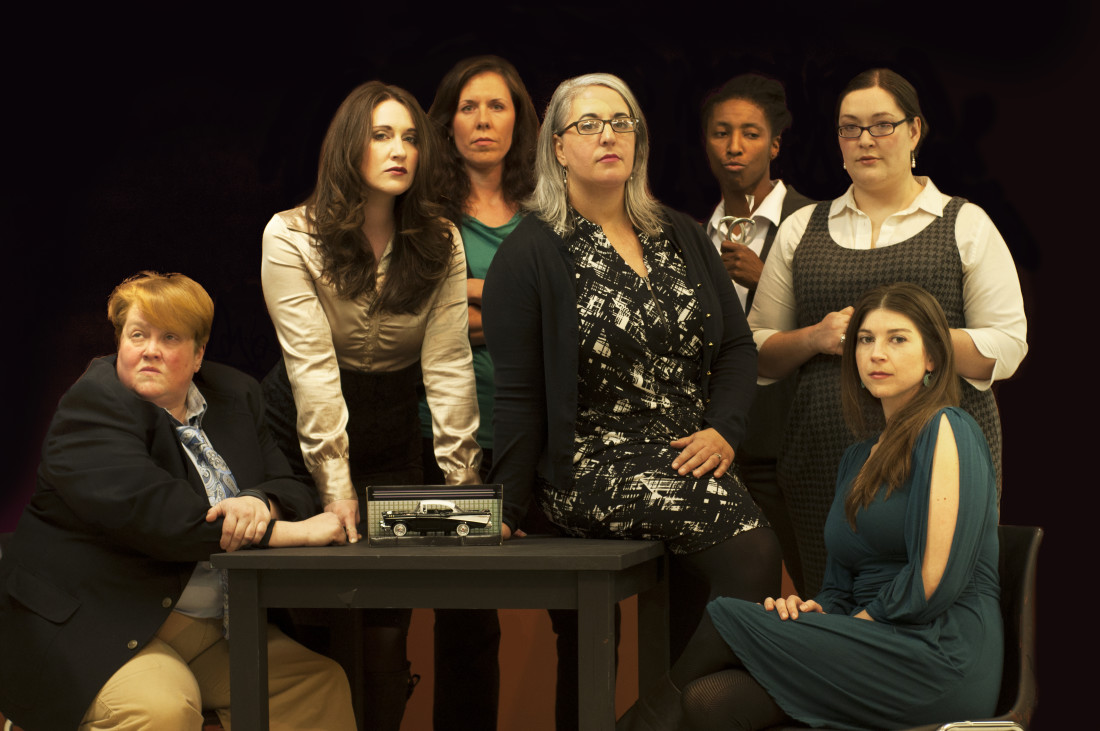In the 1992 film adaptation of David Mamet’s Glengarry Glen Ross, Alec Baldwin’s Blake — a character created specially for the screen — lights a fire under a room of real estate salesmen with a speech centered on the acronym ABC, short for Always Be Closing. Dedicated to sparking the local theatrical community through innovative casting and gender switching, Asheville performing arts collective Different Strokes also subscribes to an ABC mantra: Always Be Challenging.
“For us, theater exists for one reason only: to effect change in a provocative and entertaining way,” says Steph Hickling Beckman, Different Strokes’ managing artistic director. “We believe audiences look to the arts to see beyond themselves and their own boundaries. We believe the arts — theater in particular — can be a valuable educational medium capable of bridging cultural gaps.” Different Strokes’ commitment to these principles continues with an all-female production of Mamet’s most popular play March 3-19 at The BeBe Theatre.
In its original form, Glengarry Glen Ross doesn’t meet the collective’s selection criteria. A chosen show must be an “awareness” play, creating conversation around topics such as race, sexuality or bullying that affect the local community yet are rarely discussed. The work also has to reflect some level of diversity, whether on the stage or the page. The play — written with an all-male cast of small-time, desperate sales agents prepared to engage in unethical and illegal acts to sell undesirable real estate to unwitting prospective buyers during the final two days of an officewide sales contest — fails on both accounts.
Hickling Beckman had seen both the original script performed onstage and the James Foley film, but the text’s misogyny and overall lack of personal relatability kept her at a distance. “Although the acting and writing were stellar, it lacked something for me that I couldn’t quite put my finger on. I wanted to know more about each character and their personal lives, not just who they were in this business world,” she says. It wasn’t until Sean David Robinson, who will direct the local production, presented the idea, “that I thought what was missing would be far easier to accomplish through a female cast.”
First, Different Strokes needed Mamet’s permission. The playwright has shut down other productions that attempted gender swaps in both Glengarry Glen Ross and Oleana — a fate Different Strokes did not want to suffer. Getting the rights involved Hickling Beckman writing a letter to Mamet’s publisher, describing Different Strokes as “a very small, nonequity theater company, solely specializing in the promotion of diversity and tolerance.” She also noted that the collective is one of a kind in the region, that its productions are “consistently provocative, entertaining and well-done,” and that those involved pride themselves on highlighting the dialogue and the actors.
“It was important to tell him that while Glengarry Glen Ross presents as perfect entertainment in and of itself, in support of our mission we would very much like to tackle the script with an all-female cast. The point of the gender change would be to address the issue of gender inequality and sexism in the workplace, which, as we know, is still a hot button,” Hickling Beckman says. “An all-female cast seems even more attractive as we enter election season and the possibility that we might create another historical first by electing the first female president of the United States.”
Within 48 hours, Mamet gave his approval. Following a series of thorough auditions, Different Strokes continued its history of casting actors of a different race than what has been traditionally expected. The collective has consistently made it a priority to attract more actors of color, and its members feel that they have been the catalyst for many other theater companies doing the same. In regard to the script, other than changing the characters’ first names, which are rarely mentioned, no alterations were made beyond gender pronouns and references.
“What the audience perceives as a major change to, or adaptation of, the script is really only a change in perspective,” Hickling Beckman says. “A play becomes provocative when additional elements create unexpected reactions or challenge existing expectations.”
As a matter of policy, all Different Strokes directors must have proven directorial experience. Those who don’t must assist or co-direct with Hickling Beckman before flying solo, but since she’s previously worked with Robinson — who’s making his directorial debut — and trusts his instincts, her co-director status is essentially supervisory. “I’ll give a note here and there, but ultimately Sean is driving this ship, and it seems that neither I nor the actors have any qualms about letting him,” Hickling Beckman says.
The local nonprofit Girls on the Run will receive a portion of proceeds from ticket sales. Friday and Saturday performances include post-show discussions with the directors, cast and an invited panel.
WHAT: Glengarry Glen Ross, differentstrokespac.org
WHERE: The BeBe Theatre, 20 Commerce St.
WHEN: Thursdays to Saturdays, March 3-19, at 7:30 p.m. $18 in advance/$21 at the door. avl.mx/298




Nice
Fraud.
“We’re just a driven and ambitious as men. But then we need ‘period leave’ to cope and be productive.”
bit.ly/1QSUigL
This sounds awesome.
timothypeck, have you ever had a period? Has blood ever leaked through your pants for several days each month? Does your back hurt when this happens? What about your lower abdomen–does it feel like you’ve been punched in the gut?
Please also remember that the ability to cope with periods is literally keeping our species going. Show some gratitude for the women in your world for suffering this stuff so that you could live.